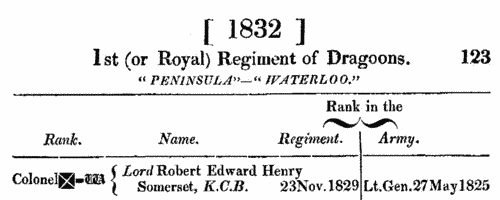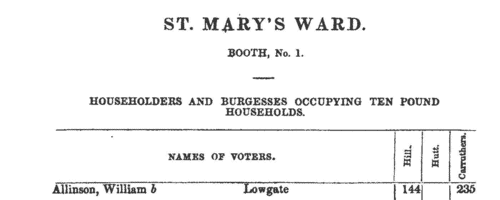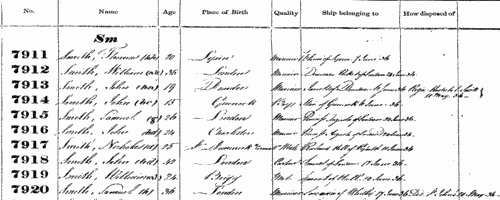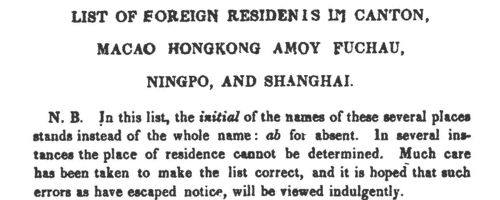Glew Surname Ancestry ResultsOur indexes 1000-1999 include entries for the spelling 'glew'. In the period you have requested, we have the following 116 records (displaying 31 to 40): Single Surname Subscription | | | Buying all 116 results of this search individually would cost £666.00. But you can have free access to all 116 records for a year, to view, to save and print, for £100. Save £566.00. More... |
These sample scans are from the original record. You will get scans of the full pages or articles where the surname you searched for has been found. Your web browser may prevent the sample windows from opening; in this case please change your browser settings to allow pop-up windows from this site. Dissolutions of Partnerships
(1829)
Trade partnerships dissolved, or the removal of one partner from a partnership of several traders
GLEW. Cost: £6.00.  | Sample scan, click to enlarge

| Officers of the British Army
(1832)
The annual Army List, published By Authority, first lists officers of the rank of major and above, by rank, and with dates of appointment to each successive higher rank; holders of crosses, crosses with clasps (with number of clasps indicated), medals, medals with clasps (with number of clasps indicated) are marked as such; and an ornate W indicates those officers actually present in any of the actions of 16, 17 or 18 June 1815 and therefore awarded the Waterloo Medal. For each officer in this section, the final column notes his then present or immediately former regiment and/or office, if any. Next, all the officers of the army are listed, down to the rank of ensign, by regiment or corps, giving rank, name, date of rank in the regiment, and date of rank in the army, with occasional further notes. Again, holders of medals are duly noted, as in the first list. For each regiment the paymaster, adjutant, quartermaster, surgeon and assistant surgeons are named, as well as the civilian agent; and the regimental motto, battle honours, and colours of the facings and lace of the dress uniform are stated. After the British regiments of the line, the officers of the West India infantry, the Ceylon rifles, the Royal African Colonial Corps, the Cape Mounted Riflemen, the Royal Newfoundland Veterans, and the Royal Malta Fencibles are given; then the officers of the garrisons and other military establishments in Great Britain, Ireland, North America and Gibraltar (with Malta); the Royal Artillery; Commissariat Department; Medical Department; Chaplains' Department; officers retained on full pay; officers on British half pay; and officers on Foreign half pay (including the German Legion, the Brunswick Cavalry, the Brunswick Infantry, Chasseurs Brittaniques, Corsican Rangers, Dillon's Regiment, the Greek Light Infantry, Malta Regiment, Meuron's Regiment, Roll's Regiment, Sicilian Regiment, Watteville's Regiment, and the York Light Infantry Volunteers).GLEW. Cost: £4.00.  | Sample scan, click to enlarge

| Electors in Hull
(1835)
A poll was taken 6 and 7 January 1835 for the election of members to serve in Parliament for the borough of Kingston-upon-Hull, the candidates being Matthew Davenport Hill, William Hutt and David Carruthers. This poll book lists all the electors in the wards of Hull (St Mary's, North, Trinity, Whitefriar, Humber, Austin, and South Myton), in Sculcoates, and in Sutton, Southcoates, Drypool &c. In each ward the names are arranged in five sections: Householders and Burgesses occupying Ten Pound Households; Burgesses not occupying Ten Pound Households; Unpolled Voters residing in the ward; Unpolled Freemen; and Non-Resident Freemen not polling. There are also short lists of votes that were tendered but the validity of which remained uncertain. In all cases full names and addresses are given: where electors voted, their votes are indicated in the right-hand columns, the numbers shown there being their numbers in the cumulating totals for each candidate. After the name of each voter there is an italic a or b showing whether he voted on the first or second day. GLEW. Cost: £4.00.  | Sample scan, click to enlarge

| Trustees and Solicitors
(1835)
Trustees appointed to take over bankrupts' estates, and their solicitors. Trustees are often friends or relatives of the bankrupt: and/or principal creditors
GLEW. Cost: £6.00.  | Sample scan, click to enlarge

| Tradesmen of Lynn in Norfolk
(1292-1836)
Lists of admissions of freemen of Lynn from the earliest surviving records to 1836 were published by the Norfolk and Norwich Archaeological Society in 1913. These lists were extracted from the tallage rolls of 1291 to 1306; the Red Register of Lynn from 1342 to 1395; from the assembly rolls for the reigns of Henry IV and V [1399 to 1422]; from the hall books from 1423; and from a list of freemen starting in 1443 in the Book of Oaths (but itself abstracted from entries in the hall books). Freedom of the borough, necessary to practise a trade there, could be obtained by birth (in which case the father's name and occupation are usually given); by apprenticeship to a freeman (the master's name and occupation being given); by gratuity; or by purchase. Both the freemen and the masters listed are indexed here. The main abbreviations used are: B., freedom taken up by right of birth; A., freedom taken up by right of apprenticeship; G., freedom granted by order of assembly (gratuity); and P., freedom acquired by purchase.GLEW. Cost: £4.00.  | Sample scan, click to enlarge

| Poachers committed to prison in Derby
(1833-1836)
In response to a parliamentary enquiry, returns were made in early 1836 from each of the gaols in England and Wales of the number of commitments, prosecutions, convictions and sentences under the game laws since 1 November 1833. The returns varied in scope; most give the full name of each poacher, date, and sentence. The usual offence is that of 'poaching', i. e. being out armed in the night in pursuit of game; occasionally it was aggravated by assaulting a gamekeeper &c.GLEW. Cost: £6.00.  | Sample scan, click to enlarge

|  British merchant seamen
(1835-1836) British merchant seamen
(1835-1836)
At this period, the foreign trade of ships plying to and from the British isles involved about 150,000 men on 15,000 ships; and the coasting trade about a quarter as many more. A large proportion of the seamen on these ships were British subjects, and so liable to be pressed for service in the Royal Navy; but there was no general register by which to identify them, so in 1835 parliament passed a Merchant Seamen's Registration Bill. Under this act this large register of British seamen was compiled, based on ships' crew lists gathered in British and Irish ports, and passed up to the registry in London. Each seaman was assigned a number, and the names were arranged in the register by first two letters of the surname (our sample scan shows one of the pages for 'Sm'); in addition, an attempt was made to separate out namesakes by giving the first instance of a name (a), the second (b), and so on. But no effective method was devised to prevent the same man being registered twice as he appeared in a second crew list; moreover, the original crew lists were clearly difficult for the registry clerks to copy, and some of the surname spellings appear to be corrupted. A parliamentary committee decided that the system devised did not answer the original problem, and this register was abandoned after less than two years: but it is an apparently comprehensive source for British merchant seamen in 1835 to 1836. The register records the number assigned to each man; his name; age; birthplace; quality (master, captain, mate, 2nd mate, mariner, seaman, fisherman, cook, carpenter, boy &c.); and the name and home port of his ship, with the date of the crew list (usually at the end of a voyage). Most of the men recorded were born in the British Isles, but not all (for instance, Charleston and Stockholm appear in the sample scan). The final column 'How disposed of' is rarely used, and indicates those instances where a man died, was discharged, or deserted his ship during the voyage.GLEW. Cost: £8.00.  | Sample scan, click to enlarge

|  London Policemen
(1830-1842) London Policemen
(1830-1842)
The Metropolitan Police Register of Joiners (MEPO 333/4) lists policemen joining the force through to 31 December 1842 (to warrant number 19892). The register is alphabetical, in so far as the recruits are listed chronologically grouped under first letter of surname. It is evidently a continuation of a similar earlier register, not closed until its alphabetical sections were filled: consequently, there are no entries in this register for the initial letters N, O, Q, U, V, X, Y or Z; and the sections of this register start at different dates - A 18 April 1840 (warrant number 16894); B 11 December 1830 (5570); C 7 September 1830 (4988); D 27 May 1833 (8445); E 15 December 1838 (14476); F 30 March 1832 (7372); G 1 December 1835 (11,184); H 25 April 1832 (7457); I and J 13 February 1837 (12449); K 2 January 1838 (13457); L 3 October 1834 (9905); M 15 November 1832 (7999); P 4 October 1831 (6869); R 4 September 1837 (13021); S 30 March 1835 (10366); T 6 April 1840 (16829); W 30 December 1833 (9096). The register gives Date of Appointment, Name, Number of Warrant, Cause of Removal from Force (resigned, dismissed, promoted or died), and Date of Removal. Although the register was closed for new entrants at the end of 1842, the details of removals were always recorded, some being twenty or more years later. Those recruits not formerly in the police, the army, or some government department, were required to provide (normally) at least two letters of recommendation from persons of standing, and details of these are entered on the facing pages: the names in these are indexed separately - this index refers only to the police constables. Where a recruit was only recently arrived in the metropolis, the names and addresses of the recommenders can be invaluable for tracing where he came from.GLEW. Cost: £8.00.  | Sample scan, click to enlarge

| Insolvents
(1844)
Insolvency notices for England and Wales: insolvency often caused people to restart their lives elsewhere, so these are an important source for lost linksGLEW. Cost: £6.00.  | Sample scan, click to enlarge

| Foreign Residents in China
(1845)
The Chinese Repository for 1845 contains this alphabetical list of foreign residents in China, giving name (surname and christian name or initials) sometimes with the addition '& fam[ily]', and italic abbreviations showing nationality (such as br for British, por for Portuguese, &c.), and where resident - a for Amoy, c for Canton, f for Fuchau, h for Hongkong, m for Macao, n for Ningpo, or s for Shanghai. ab means absent, and 'in several instances the place of residence cannot be determined'.GLEW. Cost: £6.00.  | Sample scan, click to enlarge

|
Research your ancestry, family history, genealogy and one-name study by direct access to original records and archives indexed by surname.
|













